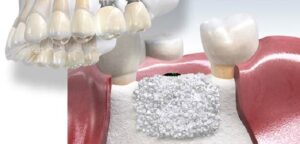What is bone grafting in the jaw and what are its benefits?
It Is known that the jawbone plays an important role in the process of dental Implants, as the process requires a healthy bone, but in some cases, there Is bone loss in the jaw, so the bone grafting process is resorted to. In this article, we will learn about this process and Its benefits.
What is bone grafting in the jaw and how is It done?
It Is a process of Implanting the jaw bones that aims to compensate for bone loss in the jaw, which allows dental implants to be performed, and it may be used even in the natural jaw that does not contain enough natural bones to perform dental implants.
The dentist first numbs the area with a local anesthetic. Next, he makes a small Incision in the gums, and the gum tissue Is moved back slightly so that the jawbone is visible. After the area is cleaned and disinfected, the doctor adds bone graft material to fix the defect. In many cases, the bone graft Is covered with a membrane for added protection. Finally, the gum tissue Is repositioned and the Incision is closed with sutures.

What are the reasons for resorting to bone grafting in the jaw?
Bone grafting of the jaw Is resorted to in the following cases:
- The jaw remains empty after the extraction of teeth or molars for a long time.
- The presence of atrophied jaw bones in some patients prevents them from doing dental implants.
- The patient who needs to shape the jaw before placing dentures.
- The presence of a patient with a loss of absence due to gum disease.
What health problems can be treated with jaw bone grafting?
Bone grafting in the jaw can treat the following conditions:
- Erosion and receding of the jaw bones as a result of the loss of teeth for a long time.
- Occurrence of fractures in the jaw bone as a result of accidents.
- Erosion of the bone around the teeth as a result of advanced gingivitis.
- Occurrence of a state of expansion of the nasal sinuses and a decrease in the amount of bone available for dental implants as a result of the loss of the posterior teeth in the upper jaw for a long time, which necessitates lifting the maxillary sinus.
What are the benefits of bone grafting in the jaw compared to other methods?
The process of bone grafting in the jaw is characterized by:
- Easy and uncomplicated.
- Painless with fast recovery.
- Allows dental Implants to be performed for patients who have bone loss in the jaw.
- The bone material used in grafts is compatible with human bones and their compatibility.
What are the side effects of bone grafting in the jaw?
Like any surgical procedure, there are some side effects that may occur after the operation:
- Infection.
- Bleeding.
- Nerve injury.
- An allergic reaction to anesthetics.

Are there potential risks of bone grafting in the jaw?
Bone grafting in the jaw is considered safe, and bone grafts in the jaw are relatively safe and the potential for risks Is very rare.

What are the expected results of bone grafting?
After the bone grafting process in the jaw, eligibility for dental implants and other corrective treatments is expected to be raised. This procedure also restores the jaw to Its original shape after trauma or loss of teeth or gums.

How long does recovery take after bone grafting?
Usually, after the bone grafting operation, the patient can feel that he has returned to his normal state within a week or two. However, wound healing may take between three to nine months, and sometimes longer, as the recovery time depends on several factors, including the type of graft and the area where it was placed in it and the patient’s body’s ability to heal.
What are the special Instructions a patient should follow after jaw bone grafting?
After performing the jaw bone grafting procedure, the patient Is advised to follow the following instructions:
- Do not touch the wound.
- Avoid spitting or rinsing for two days to allow coagulation to occur and to stabilize the material bone graft and on the third day allow.
- Do not press the tongue or fingers into the grafted area.
- Do not lift or pull the lips to look at the sutures because it may cause damage to the wound site and tearing the sutures.
- Non-smoking.
How to choose the right doctor to perform bone grafting?
The patient must search for a dentist who has experience in performing bone grafting, in order to ensure the best possible result, and understanding between the doctor and the patient is one of the most important things to ensure the success of the operation.
This content has been approved by Zein Clinic doctors
To contact the doctor and provide a free consultation, click here:
Did you like our theme? You can share it with your friends now!
Read more:
The reasons for the failure of dental implants and how to avoid them
What are the risks of dental implants?
Maxillary sinus lift for dental implants
Sources: Healthline


 واتساب
واتساب